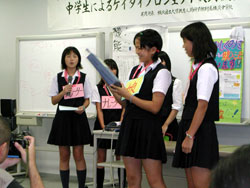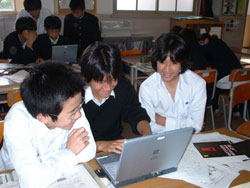MONTHLY NEWS Kids Tackle Mobile-Phone Issues |
On July 21, a group of teenagers got a rare opportunity - they stood in front of an adult audience and presented their proposals on how society can make better use of mobile phones. It was the final phase of the Mobile Phone Project undertaken by 16 girls and 14 boys at Yokohama Junior High School, which is linked to the Faculty of Education and Human Sciences at Yokohama National University. Last December, the students formed 14 teams based on their chosen topic, and were basically left on their own to come up with a proposal.
The fruits of their efforts were published as a Compilation of Research Results. One team warned against the dangers of online dating sites accessed by mobile phones, citing criminal cases where teenagers were attacked by their "virtual" friends when they actually met. Another offered practical advice on avoiding overexposure to electromagnetic rays emitted by mobile phones, which are thought to be harmful to people, while yet another urged phone companies to publicize the special options available for the elderly and the physically handicapped. The proposals weren't revolutionary. But that’s no surprise, because they were tackling real problems for which even adults had no solutions. "In standard school research, the answers are easily found on the Internet or in books, but this was different," Yusuke Sasaki, who worked on mobile phone manners, wrote in the compilation. "We had to conduct our own questionnaire to find out about people's understanding of manners, and read many manner books handed out by companies." "It was a challenging experience, and I did make a couple of mistakes," wrote Yosuke Oba, who wanted to ask a politician about the possibility of using mobile phones for voting. But e-mailing the politician got him nowhere, and it was only after making a direct phone call that he succeeded in getting an interview. "I learned something by being persistent," he said.
"There were times when students almost gave up. But they were guided by a sense of responsibility, that someone out there may be waiting for this piece of information," says Mr. Nobuo Kawaguchi, the social studies teacher who oversaw the project. "In the end, they acquired the ability to evaluate information. Conventional information is useless in persuading or helping others." "In December, I was overwhelmed just thinking about my topic, and could only nod at what the teachers were saying. But once we set our goal, I felt a sense of mission grow inside me, that I must conduct my own research to contribute to society," wrote Shino Yoshioka. Thinking and taking action - that’s the first step in grappling with the serious problems confronting us in the real world, and the 30 students at Yokohama Junior High School certainly took that important first step. "It takes courage to walk up to a stranger and ask them questions, but without action you get no results," said Hanae Suzuki, who interviewed passers-by on the street as well as the head of a local nursing care center. "You’ll never be able to think and act on your own if you only study what the teacher tells you to." Photos: (Top) Students discuss their project while examining mobile phones; (middle) Students present the fruits of their efforts; (bottom) Putting together the results of research. (Yokohama Junior High School affiliated with the Faculty of Education and Human Sciences at Yokohama National University) |

|


